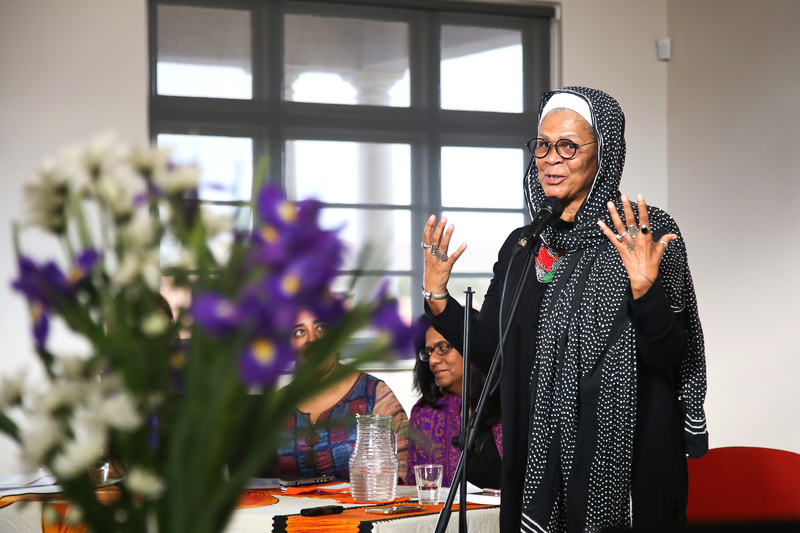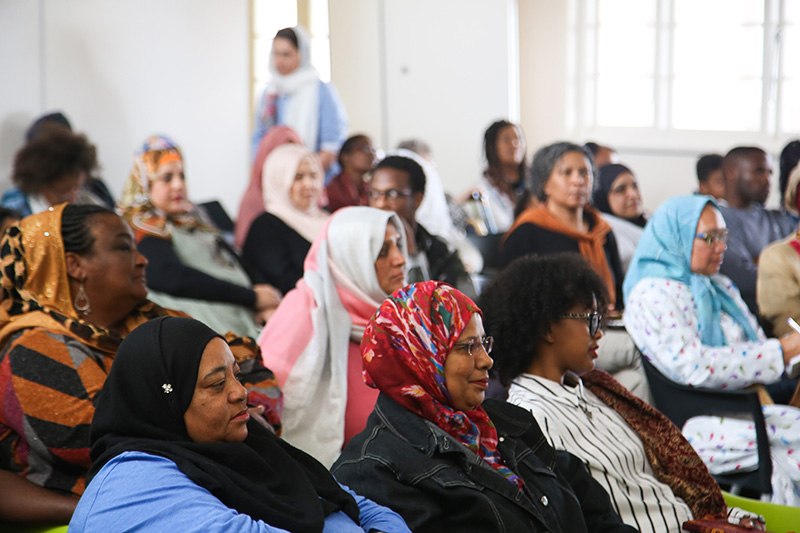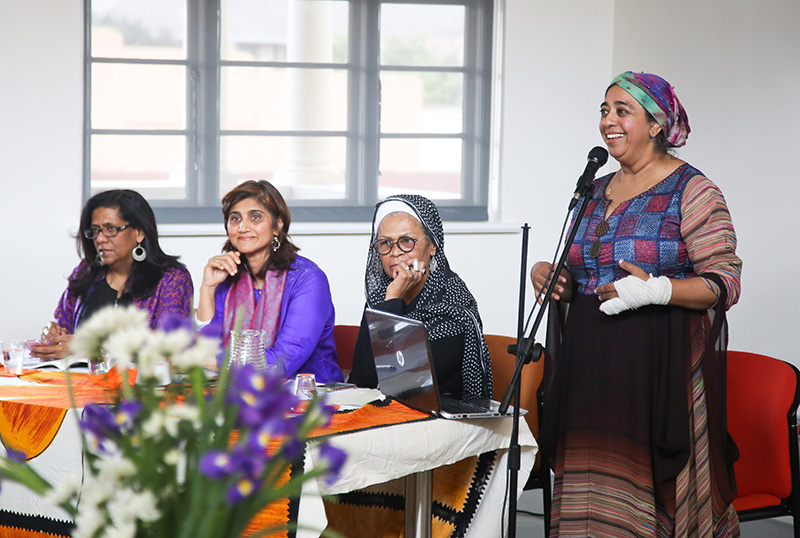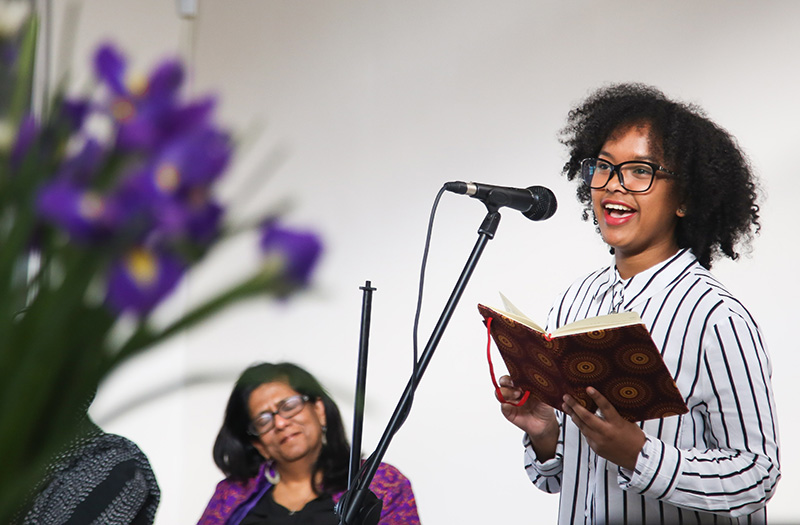‘Lady Imam’ on 25 years of the Gender Jihad
20 August 2019 | Story Carla Bernardo. Photos Je’nine May. Read time 8 min.
A quarter of a century after delivering her historic and still controversial khutbah (sermon) at the Claremont Main Road Mosque (CMRM), American Muslim philosopher Professor Amina Wadud returned to Cape Town to reflect on her life and activism.
“You are a part of the making of me,” she said, addressing a room filled almost entirely with women, of all races and ages, many of them wearing headscarves.
She was delivering a public lecture on Sunday, 18 August, opening a week-long series of events hosted by the University of Cape Town’s (UCT) Department of Religious Studies and the African Gender Institute. The series, titled “The Gender Ethics and Religious Authority 2019 Programme”, is a celebration of championing Muslim women’s religious authority.
Wadud is a prominent female imam and is both celebrated and criticised for her role as a trailblazer in the pursuit of gender equality in Islam. This struggle is popularly known as the Gender Jihad, a term coined by the progressive Muslim movement in South Africa.
“When I found the Quran, I found love.”
On 12 August 1994, she delivered the first woman-led khutbah at the CMRM, which is known for its support of an egalitarian approach to Islam. She focused on what she knew intimately as a mother of five – the womb and giving life – and explained how this reflected Islam.
News of the khutbah, which was delivered to a mixed-gender congregation, resounded across the world. It was met with praise and enthusiasm, particularly by Muslim women yearning to be represented at the minbar (pulpit).
But the backlash was immense.
Werewolves and fear
“[It was] the first place that I have ever experienced being chastised by Muslims,” the philosopher said of that experience in South Africa.
The backlash, she said, was because she had presented an idea that broke with the male-centred and mainstream approach to Islam. It was also because she had laid bare her experiences as a woman.
Breaking with tradition is not new for Wadud. She was born Mary Teasley, in 1952. Her father was a Methodist minister and the church where he preached was attached to her childhood home. Early in her student years, she practised Buddhism before converting to Islam at the age of 20.
She brought to her readings and practice of Islam “all the love from [her] father” and “all the stillness from [her] Buddhist practice”.
Five months into her new life as a pious Muslim, Wadud found the faith’s holy text.
“When I found the Quran, I found love,” she said.
“The werewolf in Muslim clothing [was] waiting just around the corner.”
Islam is the “most natural thing” and is the surrendering to “the rhythm of the entire universe”.
“You are not a servant of Allah if you are incongruent with the natural rhythm of the universe. It is so organic, it is so beautiful.”

It was, therefore, shocking to her that the backlash she faced following the 1994 khutbah came from her fellow Muslims.
Male Muslim leaders, who Wadud called “certain guardians of the faith”, demanded that the Virginia Commonwealth University (VCU), where she was employed as a professor of religion and philosophy, fire her for having delivered the now-iconic khutbah.
“They would strip from me the source of survival for myself and my children, and call it Islam,” she said.
The campaign against Wadud caused her to isolate herself out of fear, leading to her turning down requests for more khutbahs and public appearances.
“The werewolf in Muslim clothing [was] waiting just around the corner … I’m afraid of him, quite frankly.
“In fact, fear or terror is exactly what they want to inspire in your heart,” she said.
The “Lady Imam”
Criticism and fear may have forced Wadud into the confines of her office at VCU but it didn’t stop her Gender Jihad focus. Instead, she began working on constructing a new model to understand one’s relationship with Allah, and the relationship between men and women in terms of the Divine.
Throughout her readings within varied scholarly legacies in Islam, she encountered a vertical model of these relationships, which supported hierarchical forms of power between men and women. In some of these patriarchal readings, the relationship between Allah and women was also seen to be mediated by and through women’s relationships to men.

Feeling that this was the incorrect interpretation of Islam, Wadud adopted the tawhidic paradigm. A triangular model replaced the vertical one she had encountered in, for example, Sachiko Murata’s The Tao of Islam. In the tawhid, Allah is at the apex and on the left and right, in no fixed position, are male and female.
It spoke to her egalitarian vision of Islam and to “Allah’s oneness”. Through it, she realised that “it was no longer possible for any member of our community, at any place, of any gender, no matter how long the beard or how vicious the assertions, to separate me again from my Lord”.
“And then, I became the Lady Imam.”
“It was no longer possible for any member of our community, at any place, of any gender, no matter how long the beard or how vicious the assertions, to separate me again from my Lord.”
Following the adoption of the tawhidic paradigm and reinvigorated by it, Wadud began again accepting invitations for public appearances. In 2005, she delivered a follow-up khutbah to another mixed-gender congregation, this time in New York.
Among the ripples of life and activism are sermons to mixed-gender congregations that continue to take place across the world. In 2007 she was awarded the Danish Democracy Prize and a biography written by Pulitzer Prize finalist Carla Power is in the pipeline.
Banned, cancelled
It has not, however, meant the criticism has stopped or slowed down: Her texts are banned in the United Arab Emirates and earlier this year, organisers who had invited her to deliver a khutbah in Durban were forced to cancel following condemnation by other Muslim leaders.

She concluded her lecture with another insight into her approach to her beloved faith.
“Everything, everything is connected … how intimately you are connected with life itself.”
Every relationship must “reflect fundamentally what we believe is the offer that was given to us upon creation”.
Muslims, said Wadud, must know themselves and in so doing, will realise that they are but a reflection of each other. This is a crucial part of the journey towards achieving a relationship of intimacy with Allah.
“If we can have [that] on this side of the divide, then, when we die, we can experience no barrier between us and our creator.”
 This work is licensed under a Creative Commons Attribution-NoDerivatives 4.0 International License.
This work is licensed under a Creative Commons Attribution-NoDerivatives 4.0 International License.
Please view the republishing articles page for more information.
UCT celebrates women
For Women’s Month, the university’s focus is on celebrating womxn and womxn’s achievements.






























